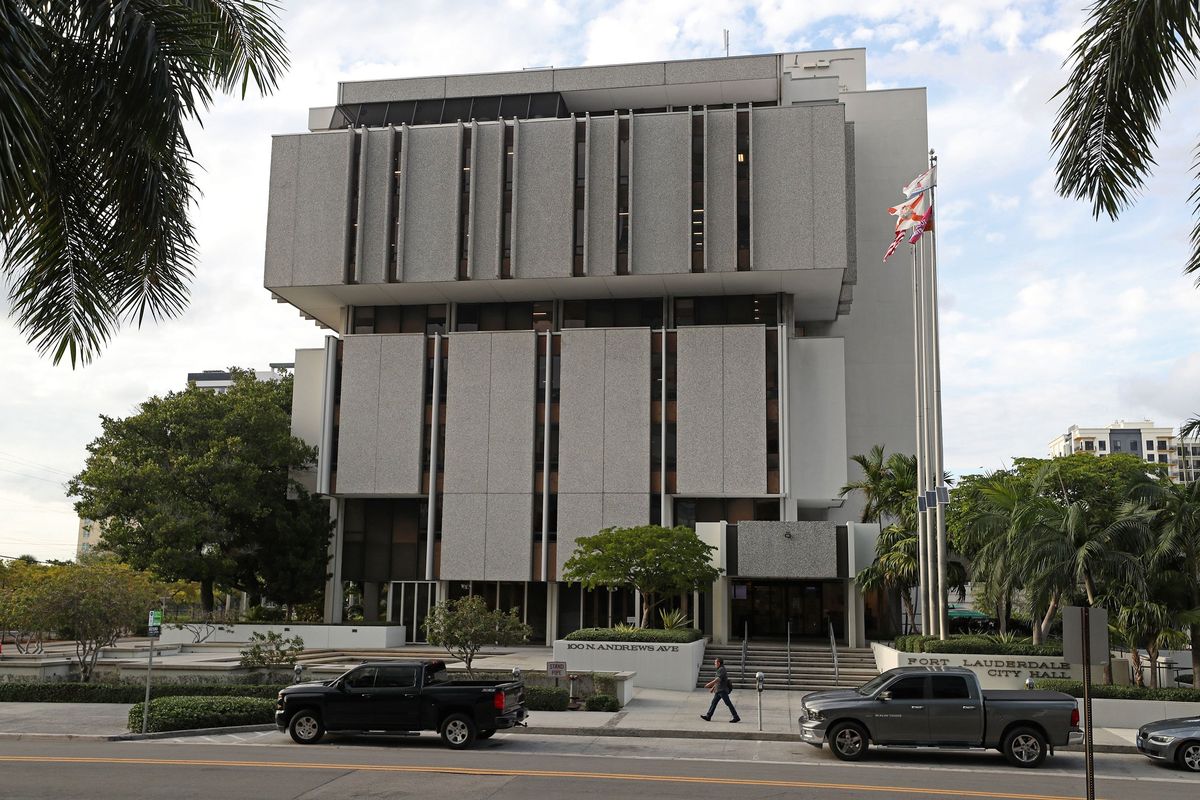‘On life support’: Fort Lauderdale needs new City Hall after epic flood

FORT LAUDERDALE, Fla. – This month’s epic rainstorm had one more unexpected victim in Fort Lauderdale: the eight-story concrete behemoth that is City Hall.
Not even the commission has been allowed back inside.
A gray bunker of a building that was birthed in the 1960s, City Hall has been closed since the storm hit on April 12. The building sustained such extensive damage, it will likely never reopen, city officials say. That means Fort Lauderdale City Hall is on the hunt for temporary offices until the building can be demolished and a new home built.
“City Hall is on life support,” City Manager Greg Chavarria told commissioners Tuesday during a virtual meeting held on Zoom.
The large and lumbering building at 100 North Andrews Ave. in downtown Fort Lauderdale was never in danger of coming down. But floodwaters infiltrated from above and below, leaving the building without power, Chavarria said.
Rainwater from the roof drained down into the building. In the basement, floodwaters reached 8 feet, destroying the mechanical and electrical equipment that keep the building running. Each and every air handler was ruined along with the vital network of electrical panels placed throughout the building.
Keeping the building operating over the next six months will cost taxpayers a staggering $50 million – or $175,000 per day, according to estimates by the city’s experts.
“It takes 150 gallons of diesel per hour to (use generators to) power the building with electricity,” Chavarria told the South Florida Sun Sentinel. “You can imagine the cost.”
During Tuesday afternoon’s commission conference meeting, Chavarria played a short video showing the damage to the building. If kept open, it would require mold mitigation throughout, a costly venture.
“What a disaster,” Mayor Dean Trantalis said as soon as the video ended.
Spending millions on a building that city leaders had already planned to replace “is out of the question,” the mayor said.
“We’d be better off moving to another building,” he added. “We clearly can’t stay in the building and operate at $175,000 a day.”
Commissioner John Herbst quickly agreed.
He suggested moving to a temporary home at 1515 West Cypress Creek Road, where a mostly unoccupied three-story Kaplan University Learning Center was move-in ready with ample space.
“We could have access to this within 30 days,” Herbst said. “We’re going to have to demolish City Hall. Let’s just condemn the building, knock it down. Then we can move forward with how we’re going to get a new City Hall built.”
Trantalis asked staff to research other sites, including those downtown.
The entire commission agreed that it makes more sense to knock down the building and move to temporary offices until a new City Hall can be built.
Leann Barber, president of Flagler Village Civic Association, was watching the meeting online but, like many, was not able to speak.
On Friday, she told the Sun Sentinel the commission was too quick in making its decision to knock down City Hall.
“If you demolish it you’re destroying a lot of value,” she said. “It’s a mid-century architectural gem. Solidly built. All concrete. I think it has its own beauty. It might still be fit for something else.”
No formal vote on the demolition of City Hall was taken, but one will come later, the mayor said.
Barber and other critics complained about the public not getting a chance to comment. Residents will get the chance to give feedback in due time, Trantalis said.
Barber suggested the city get estimates on what it would cost to fix City Hall and what it would cost to build a new one.
“That’s what you would do if it was your house,” she said. “You wouldn’t just bring the bulldozer in. I don’t think you should just wave your hands and say, ‘We’re going to demolish it.’ It just seems a little too rushed. There’s no reason to be rushing.”
But the city no longer has the luxury of time, Herbst says.
More than five years ago, Fort Lauderdale and Broward County started a serious discussion about building a joint government complex downtown. But the estimated cost ballooned to nearly $1 billion late last year, with Fort Lauderdale’s portion approaching $400 million.
Any chance of a deal blew up last October when Fort Lauderdale commissioners said they were no longer interested. We can build our own City Hall for millions less, they said at the time.
Herbst, who spent 16 years as the city auditor before being elected to the commission last November, says the storm only accelerated the timeline for building a new City Hall.
He, for one, won’t be sad to see the building torn down.
“Nothing works in it,” he said. “We’ve got mold problems. The air-conditioner system is hit or miss. And the elevators break down on a regular basis. Nobody is sad about leaving City Hall. It’s a very unattractive building to look at.”
The new City Hall should be efficient and cost-effective, Herbst said.
What about stunning?
“I’m not an advocate of designing iconic buildings on public dollars,” he said. “It doesn’t have to be ugly, but we don’t have to be on the cover of Architectural Digest.”
The mayor and Commissioner Steve Glassman disagree. Both say they envision an iconic tower that would showcase Fort Lauderdale as a city of the future.
“I don’t want to see another box as our City Hall,” Glassman said. “I think we’d look to do something a bit more bold and more reflective of the time we find ourselves in. We’re a grown-up city. We’re a different city now than we were in the mid-1960s. And City Hall has to reflect that.”